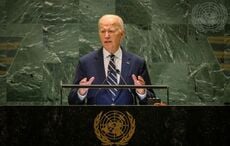The people in a small Cork village who march every week against the bailout of Irish banks are starting to draw major media attention.
A lengthy article in the Guardian Newspaper, Britain’s most influential, described the weekly walk by concerned villagers in the rustic town of Ballyhea.
______________
READ MORE:
Barack and Michelle Obama battled over immigration reform new book reveals
Irish woman trapped in a 12-year-old girl’s body, pleads for medical help
Leading Irish tenor Paul Byrom target of anti-Irish abuse in New York
_____________
Described by the Guardain as a village “in the middle of nowhere, where nothing happens;” nonetheless, the town is starting to draw major attention.
The organizer of the weekly march is former New York resident Diarmuid O’Flynn, a sports writer with the Cork Examiner newspaper.
Every Sunday without fail, rain or shine the villagers march in large numbers.
“Ballyhea may be quiet, but it's angry,” reported Guardian journalist Homa Khalell.
The march has taken place for 43 weeks straight and O’Flynn says he has no intention of stoppping.
“Personal wealth has been destroyed, thousands of people are sinking into poverty, emigration has returned and unemployment is far too high,” he told The Guardian.
“Where is the money going to come from?" he asks. "Our banks are bust. So it's going to come from us."
Morgan Kelly, professor of economics at University College, Dublin, the lone economist to predict the crash has said the true cost of the bank debt could amount to €100bn and warned: "Ireland is facing economic ruin."
Flynn says he was inspired by the Arab spring and he says the reaction of local people has been tremenduous,
"We are not trying to save the world," O'Flynn told the paper. "And it is not about the left and right. It is about right and wrong."
"We are a pretty dignified people," says O'Flynn. "So I thought,'Have it dignified and quiet;' just the fact we are marching – just let our feet do the talking."
Denis McNamara, a local businessman and farmer, said he agreed.
"I don't object to the fiscal adjustments in the economy; we can't spend more than we earn. What I do totally object to is repaying the bond-holders – who we had no responsibility for. We object to the government, without any consultation with the people, securing the money owed to those people [the bond-holders]."
Flynn says the Irish media have ignored them but they have just continued anyway.
"People are angry, no doubt about it. On the sidewalk they shout: 'Well done! Good stuff! Keep it going,' and we would say: 'Fall in with us, we are only walking up as far as the church and down to the library.' But no. People almost universally support what I am doing, but they think it is a waste of time. People feel powerless.
"I worked in Libya for three years and I know that what people were doing in Benghazi, well, they were taking their life into their hands. So, I say to the people here: 'You are not going to be shot, or gassed. You are not going to be torn apart – you just have to go out and walk.'"
“This is the biggest bank robbery in history. The difference is it's the banks robbing us."
"You definitely go through some terrible lows," says O'Flynn. "I thought a lot of these people were coming down because I was asking. So, I said to the group: 'Should we just pack it in?' But, 'No, no,' [they said]; they were determined."
"At this stage it's not about how many – it's about how long."




Comments